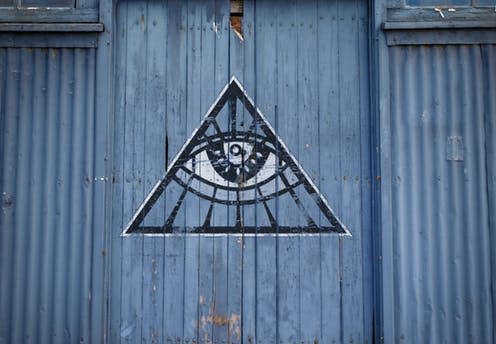How to spot a conspiracy theory – Expert guide to conspiracy theories part one

Welcome to part one of the Expert guide to conspiracy theories, a new series from The Conversation’s Anthill podcast. Over five episodes we explore why people believe in conspiracy theories, how they spread and how dangerous they are.
There are a lot of conspiracy theories out there. Some are bizarre – like the idea that Elvis faked his own death. Or that Britain’s royal family are actually shape-shifting alien lizards. A growing number of people believe the world is flat.
A lot of conspiracy theories relate to politics. That 9/11 was orchestrated by the US government so it could start wars in the Middle East. That powerful groups like the Illuminati are pulling the strings behind the scenes, plotting to establish a New World Order. Or that the new coronavirus is a bio-weapon engineered by the CIA.
Part one of the series explores what these many different ideas have in common and grapples with what actually makes something a conspiracy theory. We speak to Peter Knight, professor of American studies at the University of Manchester. He says there are three important characteristics to conspiracy theories:
The three basic assumptions are first, that nothing happens by accident. The idea that in history, there are no coincidences, no cock-ups. The second idea is that nothing is as it seems. The suggestion that you need to look beneath the surface to detect the actions and the intentions of the evil conspirators. And the third idea is that everything is connected.

More from The Conversation’s Expert guide to conspiracy theories here.
One of the difficulties with defining conspiracy theories is the fact that history is littered with real plots and conspiracies. Jovan Byford, senior lecturer in social psychology at the Open University, tells us how to spot the difference.
We also speak to Clare Birchall, reader in contemporary culture at King’s College London. She challenges us to consider who we label a conspiracy theorist and why. We find out how many conspiracy theories that sound outlandish make a lot more sense when you scratch beneath the surface of why people believe in them.
Andrew McKenzie-McHarg, senior research fellow at the Australian Catholic University, explains how the term conspiracy theory evolved from simply being a neutral theory about a conspiracy to a more loaded term. And Quassim Cassam, philosophy professor at the University of Warwick, argues that conspiracy theories are always a form of political propaganda. He says we must be aware of what ideology they are pushing and we must differentiate between the producers of conspiracy theories and those that believe in them.
The Anthill podcast is produced by Annabel Bligh and Gemma Ware. Sound design is by Eloise Stevens, with original music from Neeta Sarl and audio from Epidemic Sound. A big thanks to City, University of London, for letting us use their studios.
This article is republished from The Conversation under a Creative Commons license. Read the original article.

Annabel Bligh works for The Conversation, which received funding from the Comparative Analysis of Conspiracy Theories research network (COST Action COMPACT) to make this podcast.










